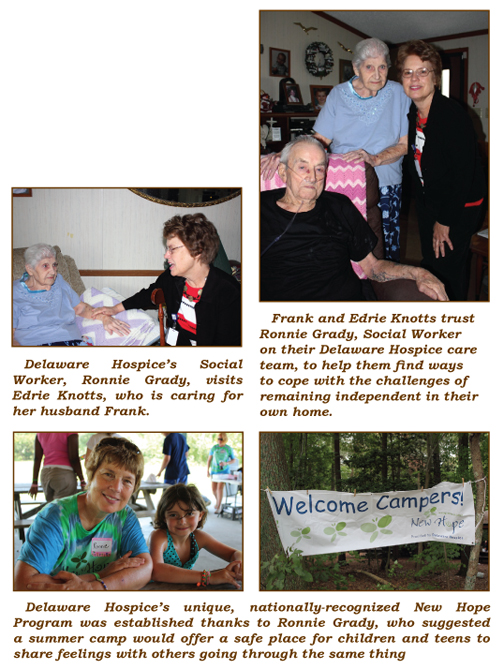Ronnie Grady Has Cared For Delaware Hospice’s Patients & Families For 26 Years!
 By Beverly Crowl
By Beverly Crowl
Ronnie Grady, MSW, joined Delaware Hospice in 1987 and has supported patients and families as both a bereavement counselor and a social worker since then. “Working in the hospice profession was a natural for me,” said Ronnie, reflecting on her past. She grew up in a medical family where her father was a family physician and her mother was a nurse, who ran her father’s medical practice built on to the house. As a child, she was constantly aware of illnesses and caregiving. “I remember making house calls with my father to the Little Sisters of the Poor or to free clinics. He provided free medical care as part of his ethics and values as a doctor.”
“About the time I was completing my training and raising six of my own children, we began to hear a lot about hospice care. One day, a friend invited me to a hospice video presentation at a local Church. We were deeply touched by it because we had both lost parents to cancer at an early age; and we agreed that if an opportunity arose, we would like to work for hospice. Soon afterwards, my friend, Jean Reynolds, became a Delaware Hospice volunteer coordinator; and a year or two later, I was hired as a bereavement counselor.”
Ronnie truly believes that Delaware Hospice has been a rewarding place for her to work. She appreciates the team approach and holistic care of hospice and she has great respect for the nurses who are so knowledgeable and compassionate.
At Delaware Hospice, social workers deal with many and varied issues. Ronnie feels that their primary concern is supporting the family and primary caregiver. “Caregiving is exhausting–physically, emotionally and mentally. For example, imagine an 85-year old wife caring for her 87 year-old husband, with no children available to help, afraid to sleep because she might miss something. As their Social Worker, I gently acknowledge that this is the most difficult thing they’ve ever gone through, but that they can’t do it alone. We try to find solutions through family members or community resources to meet caregiver’s greatest needs.”
One of Delaware Hospice’s unique, nationally-recognized, and most impactful programs was established thanks to Ronnie Grady’s identification of a need in the community. She recalled, “In terms of bereavement for family members, I felt that we needed to examine how we supported children and teens who were coping with loss. If we couldn’t effectively help kids with early intervention, what would the rest of their lives be like? I suggested that we hold a summer camp to bring them together, away from their home and school environments, to a ‘safe’ place where they could share feelings and difficulties with others who were going through the same thing.” Thus, with an initial grant from the Ronald MacDonald House, Delaware Hospice’s New Hope Program got started and grew to a statewide program offering support to children and teens in the community, as well as from Delaware Hospice families.
Contrary to what many folks think, Ronnie does not find it depressing to work in a hospice environment. And as she nears retirement, more than anything she’ll remember the inspiration witnessed countless times in two and a half decades of service. “Sometimes you’re so impressed with the courage people have—the resilience, acceptance, and heroism of caregivers. They truly give their heart and soul in an example of true love. Love is not flowers, candy or trips to Jamaica. Love is to want the best for this person, perhaps even putting aside meals or sleep to be there for them. I feel blessed to have witnessed such sacrificial love.”


